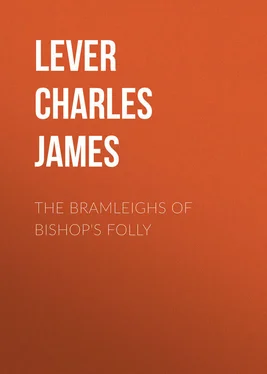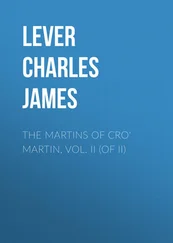Charles Lever - The Bramleighs of Bishop's Folly
Здесь есть возможность читать онлайн «Charles Lever - The Bramleighs of Bishop's Folly» — ознакомительный отрывок электронной книги совершенно бесплатно, а после прочтения отрывка купить полную версию. В некоторых случаях можно слушать аудио, скачать через торрент в формате fb2 и присутствует краткое содержание. Издательство: Иностранный паблик, Жанр: literature_19, foreign_antique, foreign_prose, на английском языке. Описание произведения, (предисловие) а так же отзывы посетителей доступны на портале библиотеки ЛибКат.
- Название:The Bramleighs of Bishop's Folly
- Автор:
- Издательство:Иностранный паблик
- Жанр:
- Год:неизвестен
- ISBN:нет данных
- Рейтинг книги:4 / 5. Голосов: 1
-
Избранное:Добавить в избранное
- Отзывы:
-
Ваша оценка:
- 80
- 1
- 2
- 3
- 4
- 5
The Bramleighs of Bishop's Folly: краткое содержание, описание и аннотация
Предлагаем к чтению аннотацию, описание, краткое содержание или предисловие (зависит от того, что написал сам автор книги «The Bramleighs of Bishop's Folly»). Если вы не нашли необходимую информацию о книге — напишите в комментариях, мы постараемся отыскать её.
The Bramleighs of Bishop's Folly — читать онлайн ознакомительный отрывок
Ниже представлен текст книги, разбитый по страницам. Система сохранения места последней прочитанной страницы, позволяет с удобством читать онлайн бесплатно книгу «The Bramleighs of Bishop's Folly», без необходимости каждый раз заново искать на чём Вы остановились. Поставьте закладку, и сможете в любой момент перейти на страницу, на которой закончили чтение.
Интервал:
Закладка:
“I ‘cannot imagine one; at least, I can’t imagine what reason you point at.”
“Simply this,” said she, half carelessly, “that it could have been no part of your duty to have told me so.”
“You mean that it was a great liberty on my part – an unwarrantable liberty?”
“Something like it.”
“That the terms which existed between us” – and now he spoke with a tremulous voice, and a look of much agitation – “could not have warranted my daring to point out a fault, even in your manner; for I am sure, after all, your nature had nothing to do with it?”
She nodded, and was silent.
“That’s pretty plain, anyhow,” said he, moving towards the table, where he had placed his hat. “It’s a sharp lesson to give a fellow though, all the more when he was unprepared for it.”
“You forget that the first sharp lesson came from you .”
“All true; there ‘s no denying it.” He took up his hat as she spoke, and moved, half awkwardly, towards the window. “I had a message for you from the girls, if I could only remember it. Do you happen to guess what it was about?”
She shrugged her shoulders slightly as a negative, and was silent.
“I ‘ll be shot if I can think what it was,” muttered he; “the chances are, however, it was to ask you to do something or other, and as, in your present temper, that would be hopeless, it matters little that I have forgotten it.”
She made no answer to this speech, but quietly occupied herself arranging a braid of her hair that had just fallen down.
“Miss L’Estrange!” said he, in a haughty and somewhat bold tone.
“Mr. Bramleigh,” replied she, turning and facing him with perfect gravity, though her tremulous lip and sparkling eye showed what the effort to seem serious cost her.
“If you will condescend to be real, to be natural, for about a minute and a half, it may save us, or at least one of us, a world of trouble and unhappiness.”
“It ‘s not a very courteous supposition of yours that implies I am unreal or unnatural,” said she, calmly; “but no matter, go on; say what you desire to say, and you shall find me pretty attentive.”
“What I want to say is this, then,” said he, approaching where she stood, and leaning one arm on the chimney close to where her own arm was resting; “I wanted to tell – no, I wanted to ask you if the old relations between us are to be considered as bygone, – if I am to go away from this to-day believing that all I have ever said to you, all that you heard – for you did hear me, Julia – ”
“Julia!” repeated she, in mock amazement. “What liberty is this, sir?” and she almost laughed out as she spoke.
“I knew well how it would be,” said he, angrily. “There is a heartless levity in your nature that nothing represses. I asked you to be serious for one brief instant.”
“And you shall find that I can,” said she, quickly. “If I have not been more so hitherto, it has been in mercy to yourself.”
“In mercy to me? To me! What do you mean?”
“Simply this. You came here to give me a lesson this morning. But it was at your sister’s suggestion. It was her criticism that prompted you to the task. I read it all. I saw how ill prepared you were. You have mistaken some things, forgotten others; and, in fact, you showed me that you were far more anxious I should exculpate myself than that you yourself should be the victor. It was for this reason that I was really annoyed, – seriously annoyed, at what you said to me; and I called in what you are so polite as to style my ‘levity’ to help me through my difficulty. Now, however, you have made me serious enough; and it is in this mood I say, Don’t charge yourself another time with such a mission. Reprove whatever you like, but let it come from yourself. Don’t think light-heartedness – I ‘ll not say levity – bad in morals, because it may be bad in taste. There’s a lesson for you, sir.” And she held out her hand as if in reconciliation.
“But you have n’t answered my question, Julia,” said he, tremulously.
“And what was your question?”
“I asked you if the past – if all that had taken place between us – was to be now forgotten?”
“I declare here is George,” said she, bounding towards the window and opening it. “What a splendid fish, George! Did you take it yourself?”
“Yes, and he cost me the top joint of my rod; and I’d have lost him after all if Lafferty had not waded out and landed him. I ‘m between two minds, Julia, whether I ‘ll send him up to the Bramleighs.”
She put her finger to her lip to impose caution, and said, “The admiral,” – the nickname by which Jack was known – “is here.”
“All right,” replied L’Estrange. “We’ll try and keep him for dinner, and eat the fish at home.” He entered as he spoke. “Where ‘s Jack. Did n’t you say he was here?”
“So he was when I spoke. He must have slipped away without my seeing it. He is really gone.”
“I hear he is gazetted; appointed to some ship on a foreign station. Did he tell you of it?”
“Not a word. Indeed, he had little time, for we did nothing but squabble since he came in.”
“It was Harding told me. He said that Jack did not seem overjoyed at his good luck; and declared that he was not quite sure he would accept it.”
“Indeed,” said she, thoughtfully.
“That’s not the only news. Colonel Bramleigh was summoned to town by a telegram this morning, but what about I did n’t hear. If Harding knew – and I ‘m not sure that he did – he was too discreet to tell. But I am not at the end of my tidings. It seems they have discovered coal on Lord Culduff’s estate, and a great share company is going to be formed, and untold wealth to be distributed amongst the subscribers.”
“I wonder why Jack did not tell me he was going away?” said she.
“Perhaps he does not intend to go; perhaps the Colonel has gone up to try and get something better for him; perhaps – ”
“Any perhaps will do, George,” said she, like one willing to change the theme. “What do you say to my decorations? Have you no compliments to make me on my exquisite taste?”
“Harding certainly thinks well of it,” said he, not heeding her question.
“Thinks well of what, George?”
“He’s a shrewd fellow,” continued he; “and if he deems the investment good enough to venture his own money in, I suspect, Ju, we might risk ours.”
“I wish you would tell me what you are talking about; for all this is a perfect riddle to me.”
“It ‘s about vesting your two thousand pounds, Julia, which now return about seventy pounds a year, in the coal speculation. That’s what I am thinking of. Harding says, that taking a very low estimate of the success, there ought to be a profit on the shares of fifteen per cent. In fact, he said he wouldn’t go into it himself for less.”
“Why, George, why did he say this? Is there anything wrong or immoral about coal?”
“Try and be serious for one moment, Ju,” said he, with a slight touch of irritation in his voice. “What Harding evidently meant was, that a speculative enterprise was not to be deemed good if it yielded less. These shrewd men, I believe, never lay out their money without large profit.”
“And, my dear George, why come and consult me about these things? Can you imagine more hopeless ignorance than mine must be on all such questions?”
“You can understand that a sum of money yielding three hundred a year is more profitably employed than when it only returned seventy.”
“Yes; I think my intelligence can rise to that height.”
“And you can estimate, also, what increase of comfort we should have if our present income were to be more than doubled – which it would be in this way.”
Читать дальшеИнтервал:
Закладка:
Похожие книги на «The Bramleighs of Bishop's Folly»
Представляем Вашему вниманию похожие книги на «The Bramleighs of Bishop's Folly» списком для выбора. Мы отобрали схожую по названию и смыслу литературу в надежде предоставить читателям больше вариантов отыскать новые, интересные, ещё непрочитанные произведения.
Обсуждение, отзывы о книге «The Bramleighs of Bishop's Folly» и просто собственные мнения читателей. Оставьте ваши комментарии, напишите, что Вы думаете о произведении, его смысле или главных героях. Укажите что конкретно понравилось, а что нет, и почему Вы так считаете.












